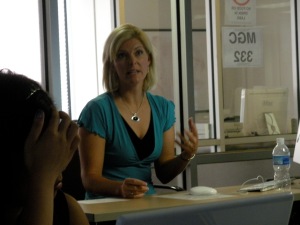Editing: Day Two
Anel and I had finished editing the majority of our video project on Tuesday, so we spent today fine tuning what we had. My biggest concern was creating a coherent story that had a natural flow. Unfortunately, while we were editing, we realized that our piece would benefit for additional B roll that we didn’t have. (In particular, I felt that the second interview segment with the tour bus driver would have worked better.)
I was surprised that using Final Cut Pro came as easily as it did to me. When I was in high school, I attempted to use Avid in one of my media classes and failed miserably. When I do video stories during the semester, I want to work on my interviewing skills and on making my editing tighter. While I know I my video skills leave much to be desired, I’m proud that I was able to work in a new medium and create a finished product.
Remembering a Legend
Watching the special on Walter Cronkite’s life (of which our guest speaker Susan Zirinisky was executive producer) reminded me of why I want to be a journalist. I hope to avoid the current politicization of news and follow Cronkite’s example of providing a calm and unbiased look at the nation and the world.
Although I was not able to see him in action (I was born after he retired from CBS), he still was the voice of history; when I watch footage of the major events of the late 20th century, he was always there. I agree with the commentators in the Cronkite special that there will never be another journalist with his influence (and that probably is a good thing), but I hope to be in a generation of journalists who will be a throwback to the values he obviously held closely – he didn’t feel the necessity to share his opinions, he simply reported the news.
Susan Zirinsky – “I embrace the fear”
Anyone entering a new career is bound to experience anxiety. According to Susan Zirinsky, an executive producer of CBS’s “48 Hours,” told American University journalism graduate students that they have to learn to embrace the fear, that it is important.
“I don’t think I’ve ever gone into a job I felt I was ready for,” Zirinsky said.
I always assumed the on-the-job fear goes away, but Zirinsky’s frank admission, especially considering her accomplishments and experience, made me feel a little better about my own anxiety.
While her talk covered a multitude of topics, she continued the theme we have heard for the last two weeks during bootcamp – embrace technology.
While some of our guestspeakers have sounded a negative note about the future of journalism, Zirinsky explained that because of the Internet, we will have many more places to get a job. We will face the challenge of finding out “how to have a voice” though.
Zirinsky advised us to find a job that we “can’t wait to get to the office in the morning” even if it terrifies us.

